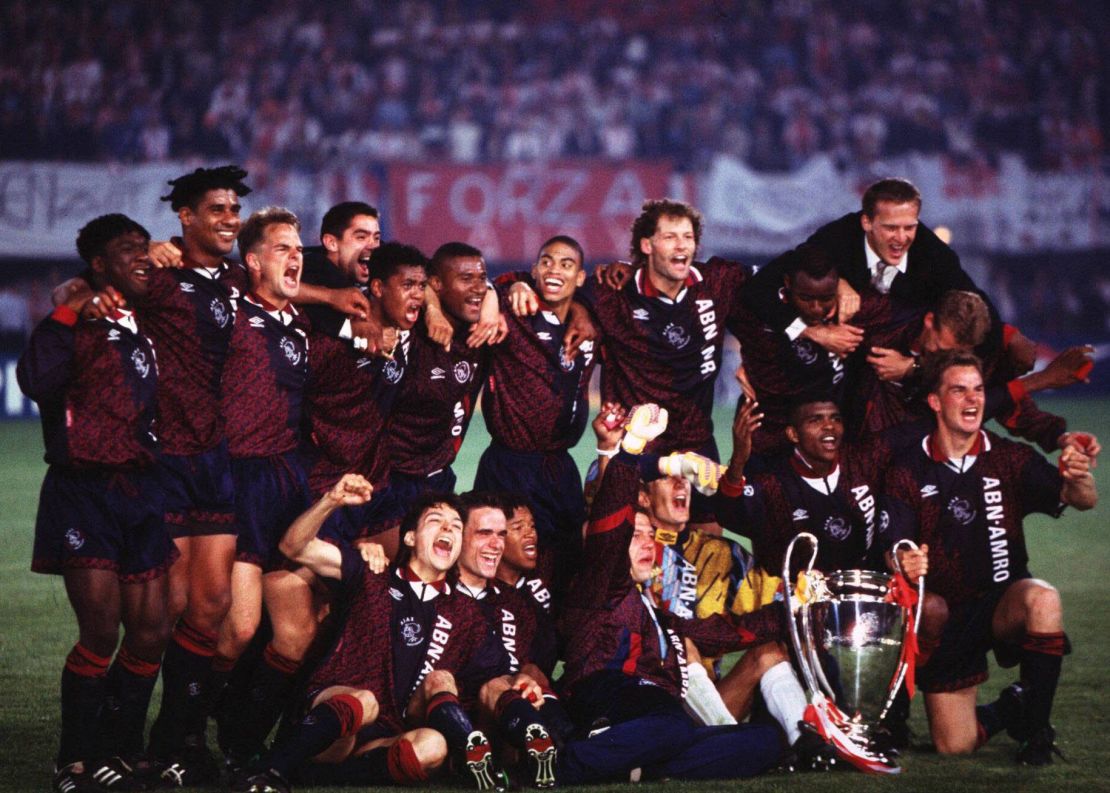Story highlights
Ajax to open new school for youth players
It will allow them to study and play football
Facility will be at heart of training complex
Dutch club renowned for its talent factory
Could this become sport’s perfect finishing school? And in future might it even help revive the Netherlands’ international fortunes?
Ajax Amsterdam is already renowned for the success of its youth academy, but the Dutch football club is now taking its center of learning to new levels. Given the Netherlands have just failed to qualify for the European Championship, the initiative couldn’t have come at a better time.
The starting ground for celebrated players such as Johan Cruyff, Dennis Bergkamp and Wesley Sneijder, Ajax has recently opened a new educational facility on its training grounds.
“Ajax is extremely proud to have realized ‘The School of the Future,’” the club told CNN.
“We are aware that it is important for our young players that they are able to follow a decent education next to playing football. The study facilities are of a very high standard.”
True to its name – “De Toekomst” (or “the Future”) – the club’s training complex is becoming more than just a place where players improve their football skills – Ajax’s aspiring pros will now be receiving a customized education at a dedicated school.
“Ajax School will work in tandem with existing external education programs, supplementing conventional education with a sport/football-based curriculum,” says Steve Lawrence, an Englishman working as an adviser on the project.
“The educational philosophy is child-centered with a faculty of tutors and mentors able to guide the children across a broad range of subject areas encouraging individual in depth exploration,” he told CNN.
Ajax has a long history of valuing its footballers’ educational performance.
The club focuses on ensuring its pupils acquire a decent education while pursuing their dream of becoming a professional player – of which its academy boasts a remarkable 80%-plus success rate.
Students will receive lectures on healthy nutrition, kinesiology (the scientific study of human movement), media training, and courses in attitude and behavior. They will also be taught about economy, tax and finances, giving them all the required tools and skills to be a modern-day footballer.

The school looks out over the first-team training field and the club’s home Amsterdam Arena, and offers a library, multimedia studio and language/science labs.
“The focus of the Ajax School is the players’ ‘kitchen’ – which is both teaching space and congregating space,” says Lawrence, whose son Jamie flourished in the Dutch system, before joining Slovakian team AS Trencin.
“It’s big enough for all 220 players and staff, and informal and relaxed enough to be ‘home from home’ for the players.”
While many aspiring footballers may sacrifice their studies in order to focus on their career, that won’t happen for the Ajax intake.
The new school offers young players the opportunity to follow their entire schooling within the club, ensuring their education can be tailored and customized around their training and competition schedules.
In the past, players such as Jan Vertonghen had to give up his studies in Law and French at the University of Amsterdam. The Belgium international – now at English club Tottenham – did, however, manage to study sport marketing at the Johan Cruyff University in between his training and matches.
Ajax says having a school for its youth pupils should improve performance on the field as well as in academics. Players can be monitored better and the club can intervene quicker should the balance of chasing the football dream and finishing education become distorted.
Even more importantly, footballers will always be able to fall back on their school diploma if they do not make it to the top, safeguarding the players’ future.
Ajax, a four-time European champion and 33-time winner of the Dutch league, has traditionally relied on players from its youth academy. Like Spain’s Barcelona, it immerses players in its philosophy from the earliest age possible.
The club’s groundbreaking concept of “Total Football,” a free-flowing and attacking tactic in which any outfield player can take over the role of any other player, revolutionized Dutch football.
Pioneered by legendary coach Rinus Michels, it helped Ajax to three successive European Cup triumphs in the early 1970s.
The Dutch national team reached the 1974 World Cup final under Michels’ guidance – a feat it would repeat four years later despite the absence of Cruyff.
Cruyff epitomized the “total football” player in the 1970s, coordinating both offense and defense, as well as being a midfielder. His influence has also been widely credited for the more recent success of Barcelona’s “tiki-taka” style.

Two decades later, Ajax would repeat those heights under coach Louis van Gaal – who famously took a team based on youth to victory in the 1995 UEFA Champions League final against titleholder AC Milan.
The team’s 4-3-3 formation has remained a central component and house style ever since. Ajax works hard on keeping its tactics recognizable and unique: fast and offensive while creative and attractive.
These days Ajax struggles to keep its promising players, who are lured by the riches of foreign clubs – such as those in the English Premier League – at an increasingly earlier age.
Critics claim that Ajax has turned into a business, a talent factory where young players are selected and trained only to be sold to the highest bidders, often at immense fees.
Although this strategy may not win Ajax a new European prize in the decade to come, it does help the club to at least shine financially – last month it reported a profit of €22 million ($24.8 million) for the 2014-15 season.
If there was a new Champions League dedicated to clubs competing on financial sustainability, Ajax may finally stand a chance again.
Who’s your favorite Ajax player? Tell us on CNNFC’s Facebook page
Additional reporting by John Sinnott



















